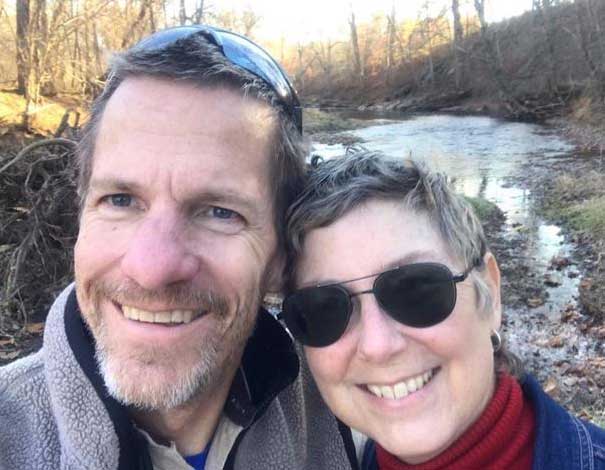Transplant takes a huge financial toll on you and your loved ones. After leaving the hospital, you may still be managing costs not covered by your insurance, as well as new costs for things like hotels, copays, parking, medicines, etc. For most people, managing finances is very stressful. Jodi and her husband Mike had to make many difficult decisions after her transplant.
Rising costs, lower income
Jodi’s transplant journey took place in Seattle, Wash. After returning to their home across the country in Maryland, Jodi and Mike had a big adjustment to make.
“Our overall costs actually went up once we got home from the hospital,” Jodi said. She listed a few unexpected expenses:
- Travel costs. After they got home, they needed to return to the hospital in Seattle, so there was more money spent on travel.
- Medication costs. Jodi was taking a lot of different medicines that frequently changed. “The cost of my medications was our biggest concern,” she said. Some would be covered by our insurance, some we paid for out-of-pocket, and some we couldn’t afford at all. It was a lot of juggling,” She added that she had mixed emotions about her insurance company. She’s thankful that insurance paid a lot of money for her transplant, yet frustrated at how little they helped with the medicines she needed to stay healthy afterwards.
- One-income household. After her transplant, Jodi wasn’t healthy enough to return to her job. “Before my diagnosis, I still had a 10-15 year working window,” she said. “I thought I’d be able to go back to work after my transplant. I was in good health and had no other complications. So it was hard for me when I realized that I couldn’t go back to work.”
Perhaps Jodi’s story sounds similar to your experience after returning home from the hospital. She shared some of the decisions they’ve made, and offered some advice for readers.
What can you do?
Jodi recommends meeting with two people:
1. Financial planner. “We didn’t plan to pay for a serious medical diagnosis, so it quickly drained our savings account and our retirement fund,” she said. “We needed to find another way.” The financial planner helped them brainstorm ways to cut unnecessary costs and increase their income. You could:
- Apply for medical disability through social security. Jodi asked their medical team to fill out the questionnaires. She says, "Be persistent. We were originally denied, so we appealed and we were finally approved. It wasn’t much, but the extra money helped.”
- Cut back on your internet and cable plan. Go to the library to check out movies. To use the internet, go to places that have Wi-Fi, like the gym.
- Go out for dinner less often. Jodi says that they even changed up their groceries from more pre-packaged foods to “less convenient” items (for example, a bag of raw, uncooked beans instead of a can of baked beans).
- “Buy used.” Shop at consignment stores or consignment apps, rather than buying things brand new.
You can also try fundraising. It can be hard to ask for help, but people in your community often want to help but don’t know how. Ask a close friend or family member to help you coordinate this. Our financial grants can help you pay for things like copays, housing, transportation, or GVHD medical costs. Ask someone from your transplant team to apply on your behalf.
2. Counselor. “A counselor really helped Mike and me communicate during all of this,” she said. “We had to make a lot of really hard decisions. It helped to talk about these compromises in a healthy way so neither of us felt bad. Some things may be painful now, but can help in the future. You have to be willing to be vulnerable and share with others, but meeting with a financial planner and counselor will help you sort through things and come up with a plan that works for you.”
Our Be The Match Patient Navigators talk with patients about life after transplant, including financial and insurance issues. There are many helpful resources, but the list can be overwhelming. They can help figure out what your needs are and to find the resources that can help your situation. They can even connect you to free financial planners and counselors.
Connect with a BMT Patient Navigator or Social Worker:
- CALL or TEXT: 1 (888) 999-6743
Monday through Friday, 8 a.m.–5 p.m. Central Time - EMAIL: patientinfo@nmdp.org
The Be The Match Patient Support Center also offers more support resources:
- Join a group of peers in a telephone support group or on Facebook.
- Connect with someone who’s struggled with money after transplant.

